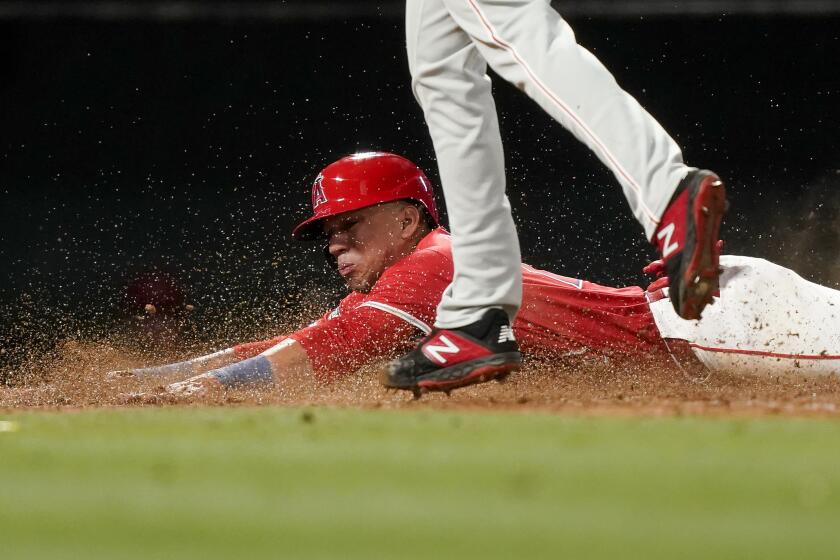Whole New Ballgame
Trumpets blare and water bottles partially filled with coins jangle throughout Satoshi Morita’s at-bat late in a game his team is trailing.
A few dozen fans -- some in colorful kimonos, others wearing homemade T-shirts proclaiming themselves members of the Japan Samurai Bears Fan Club -- call out in coordinated Japanese chants from seats behind third base at Cal State Fullerton’s Goodwin Field.
“Big hit! Big hit! Morita! Let’s go! Let’s go!”
The cacophony might annoy an American ballplayer, but it is a rare and cherished reminder of home for members of the first all-Japanese team to regularly participate in an American professional sports league.
The Samurai Bears, perpetually the visitor, are two-thirds of the way through a grueling season of 90 games in 96 days, enduring 15-hour bus rides, low-budget hotels and stomach-turning fast food as they schlep from stadium to stadium in the independent Golden Baseball League, a first-year minor league circuit based in California and Arizona.
“I can’t believe we’re actually doing it,” pitcher Takaaki Igarashi said through an interpreter during a postgame interview. “It’s not that it’s really hard. I just get sick of eating hamburgers all the time.”
The concept of the Samurai Bears was developed by Golden League Vice Commissioner Takenori Emoto, who was searching for opportunities for players who slipped through the cracks of Japan’s shrinking minor league system. Only 82 players were drafted last year by the nation’s 12 major league teams, leaving scores to look elsewhere to sustain their careers.
The original idea was to include a few Japanese players on each of the league’s eight teams, but there were concerns in Japan that those players would adopt the American style of baseball and have trouble fitting in when they came home. So the Samurai Bears were born.
Their journey has been fraught with comical misadventures and lost-in-translation moments, such as when one player mistakenly entered an occupied women’s bathroom at a restaurant.
“He came out and was very apologetic and was bowing to the lady,” recalled Warren Cromartie, the Samurai Bears’ fast-talking, gap-toothed manager.
Cromartie, 51, can relate to the experience of navigating a strange land. The former Montreal Expo outfielder was honored in 1989 as the most valuable player of the Central League in Japan as a member of the Yomiuri Giants. But despite his many accomplishments, he recalls being nearly halfway through his seven-year career in Japan before he really gained acceptance -- mostly because of the circumstances in a whirlwind 48 hours. All it took was getting hit in the head by a pitch, spending the night in a hospital and coming back the next day to hit a game-winning grand slam.
Cromartie commands the respect of his players, though they privately joke that it might be easier to play for North Korean leader Kim Jong Il.
Though affable in the clubhouse, Cromartie has sent so many players home that the team now has a roster of only 21, three below what the league allows.
Among the players Cromartie ran off was one whom he considered “a Barry Bonds wannabe.”
“Bad attitude. All about himself,” the manager said. “Thought he was all that and a bag of sushi.”
Another player said he couldn’t participate because of injuries, then arrived at the ballpark with three women in tow. “He will not be a part of the Samurai Bears ever again!” Cromartie said. “Showed up with three women!”
The team is 21-35 and last in the league’s Arizona Division, but things have improved considerably since it lost 13 of its first 15. The hitters are getting used to the movement of the Americans’ breaking pitches, and a slew of new outfielders has bolstered the defense.
“A lot of it is that Cromartie is laughing a little more these days,” said pitcher Igarashi, who is among several players who left behind a wife in Japan. “In the past, Cromartie was really tough on some of the guys and they were really nervous about whether they would get sent home the next day if they screwed up. It’s a lot better these days. We’re able to relax.”
Said Cromartie: “I’m seeing the same mental mistakes every other day. It was every day, now it’s every other day.”
The players’ hustling, team-oriented approach served it well during a recent victory over the Fullerton Flyers. A five-run inning was sparked when Shinichiro Uchino legged out a two-out infield single. And when light-hitting outfielder Tatsuhiko Muranishi belted his first homer of the season, he was greeted at home plate by a woman dressed in a kimono who presented him with a teddy bear.
But in another game a runner was picked off first base late in a game in which the Samurai Bears trailed by three runs, and a pitcher watched a popped-up bunt fall for a hit.
At one point, a fan wearing a Samurai Bears cap engaged the gregarious Cromartie, who was coaching at third base.
“The first time I came out they couldn’t hit-and-run, do nothing,” the fan complained.
“All year,” Cromartie responded matter-of-factly. “Sometimes I lose it.”
The challenges don’t end on the field.
The players battle loneliness and quickly tired of the bus travel. Then there’s the food. One time they left untouched their entire postgame spread -- a stack of bologna sandwiches -- opting to board the team bus hungry.
But between games of a recent doubleheader at Fullerton, players scarfed a home-cooked meal of breaded fried chicken, rice, tofu and Oriental salad provided by Russ Hansen, a longtime friend of Cromartie’s.
“You could see the glow in their eye,” said Hansen, a Brea resident who along with his wife, Sue, served the team in the visiting bullpen.
When the fare provided for them is unsatisfactory, players compensate by cooking in their hotel rooms. Almost every player totes along a rice cooker to make simple Japanese dishes, occasionally concocting something more elaborate with meat or curry and inviting his teammates over.
“I’m a very stereotypical Japanese person who needs to eat rice and miso soup and fish every day,” pitcher Taishi Sasaki said. “Being here, I really don’t have a choice but to eat a lot of fast food and meat. It makes my stomach uneasy.”
Does Sasaki like any American food?
“T-bone steak,” he replied in English.
A more vexing matter for some are the bus rides to remote outposts such as Chico, Calif., and Yuma, Ariz. The bus is equipped with a VCR that often plays Japanese dramas or variety shows when Cromartie hasn’t commandeered it.
“The food is OK, but the bus, because my body is so big, it’s hard to fit on the bus,” said pitcher Keisuke Ueno, 6 feet 4 and 205 pounds. “That’s the toughest part for me.”
Players spend most of their free time sleeping, e-mailing friends or lounging by the pool of their two- or three-star hotels. Almost every player has a laptop.
“Every now and then a friend will see the box scores on the Internet and call me or write me an e-mail and say, ‘How come you’re getting rocked?’ ” said Sasaki, whose fastball tops out at 93 mph.
Interest back home has fallen considerably since the beginning of the season, according to Shinichi Tsugawa, a special correspondent for the Hochi Shimbun, a sports newspaper based in Tokyo.
“It’s been a very big topic that a team from Japan was going to go to America and compete against American teams,” Tsugawa said through an interpreter while visiting the team in Fullerton. “But their record hasn’t been great, so the topic isn’t so popular now.”
Many of the Samurai Bears concede they would be out of baseball if it weren’t for this opportunity. Sasaki, 22, was working a 9-to-5 human resources job alongside shortstop Yasumichi Minami when they heard about the Samurai Bears.
The most accomplished player is first baseman Yuji Nerei, who reached triple-A Ottawa, where he played alongside current major leaguers Milton Bradley and Brad Wilkerson. Nerei went to major league spring training with the Expos in 2001 before being released by the organization.
At 31, Nerei has given up on reaching the major leagues but likes the idea of the cultural exchange provided by the Samurai Bears and is interested in becoming a coach. He already serves as a player-coach and a mentor to many players.
Ueno, the pitcher who laments the long bus rides, has drawn interest from several scouts and could become the first Samurai Bear signed by a major league organization. Other players hope to latch on with pro teams in Japan.
Golden League co-founder Amit Patel said that officials have approached him from other baseball-crazed nations and that it’s conceivable the league could eventually feature teams from South Korea, China or Taiwan.
Players from the Samurai Bears and Long Beach Armada will play an exhibition against the Taiwan national team Saturday at 3 p.m. at Blair Field in Long Beach, before the Golden League game between the Samurai Bears and Armada at 7.
“It’s a key part of our vision,” Patel said. “We wanted to create a league that takes advantage of the growth of baseball all over the world.”
Azumi Maeda, a 21-year-old Cal State Fullerton student from Nagasaki, Japan, wore a red kimono with a white flower print to a Samurai Bears game at Fullerton. She stood and cheered with a handful of classmates whose spirit was not dampened by a 6-0 defeat.
“We come to every game,” Maeda said.
The Samurai Bears insist they would have a better record if they had a home base, which league officials hope to give them in 2006. Fullerton and Long Beach, where there are sizable contingents of Japanese Americans, are among the options.
“Here and in Long Beach, there are many Japanese people,” Nerei said before a game at Fullerton. “They cheer the Japanese way, with the trumpet. That makes us very comfortable and feel at home. It feels like Japan.”
More to Read
Get our high school sports newsletter
Prep Rally is devoted to the SoCal high school sports experience, bringing you scores, stories and a behind-the-scenes look at what makes prep sports so popular.
You may occasionally receive promotional content from the Los Angeles Times.







